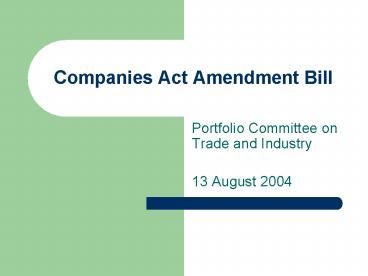Companies Act Amendment Bill
Title:
Companies Act Amendment Bill
Description:
Why should the bona fide holder of shares be protected instead of the original owner? ... The normal principle of caveat emptor (buyer beware) cannot apply. ... – PowerPoint PPT presentation
Number of Views:143
Avg rating:3.0/5.0
Title: Companies Act Amendment Bill
1
Companies Act Amendment Bill
- Portfolio Committee on Trade and Industry
- 13 August 2004
2
Three questions raised by Members on Wednesday
- Why should the bona fide holder of shares be
protected instead of the original owner? - What protection is there for the original owner?
- Is this amendment being sought because of an
increase in fraud in electronic share
transactions? If not, what is the reason for the
amendment?
3
Why should the bona fide holder of shares be
protected instead of the original owner?
- Members clearly understood that both the original
(dispossessed) owner and the subsequent holder
are innocent in a transaction, but that the law
can only protect the right of ownership of ONE of
them.
4
Why should the bona fide holder of shares be
protected instead of the original owner?
- The workings of an exchange
- Sellers offer their securities for sale and
Buyers place orders for the shares they want to
buy. - Buyers do not have any contact with Sellers and,
in fact dont know whose shares they are buying. - The normal principle of caveat emptor (buyer
beware) cannot apply.
5
Why should the bona fide holder of shares be
protected instead of the original owner?
- For these reasons
- the system itself must guarantee good title
- buyers of shares through-out the world will not
deal on any exchange that does not guarantee good
title - the law in every modern jurisdiction with a
securities exchange protects the bona fide
purchaser rather than the dispossessed owner.
6
Why should the bona fide holder of shares be
protected instead of the original owner?
- Even if the transaction took place outside of an
exchange, the practical difficulties in restoring
ownership to the dispossessed owner are enormous.
7
Why should the bona fide holder of shares be
protected instead of the original owner?
bona fide holder 20 000 shares
bona fide holder 15 000 shares
bona fide holder 5 000 shares
8
What protection is there for the person who lost
his / her shares?
9
What protection is there for the person who lost
his / her shares?
- The dematerialised shares of a shareholder are
held by a Central Securities Depository
Participant (CSDP). The CSDP is a custodian of
the shares on behalf of the shareholder. - Shares are held in an account and may only be
taken out of the account if the shareholder gives
an instruction (mandate) to the CSDP.
10
What protection is there for the person who lost
his / her shares?
- In the event of an unauthorised transfer or
withdrawal from that account, the shareholder
would normally have recourse against the CSDP for
breach of mandate. - (An obvious exception would be if the shareholder
himself / herself facilitated the fraud through
his / her own negligence.) - The amount of compensation paid to the
shareholder can be used buy shares of the same
type to replace those that were lost.
11
Is this amendment being sought because of an
increase in fraud in electronic share
transactions? If not what is the reason for the
amendment?
12
Is this amendment being sought because of an
increase in fraud in electronic share
transactions? If not what is the reason for the
amendment?
- At the time of introducing section 91A in 1998,
we overlooked the fact that there may still be a
possibility that a rectification order be granted
in terms of section 115 of the Companies Act. At
the same time, the risk of tainted shares was
unquantifiable. - In response to this a Dispossessed Members Fund
was established with R 2 billion in cover,
underwritten by Lloyds of London. This provided
alternative relief to dispossessed members so
that recourse in terms of section 115 would
become unnecessary.
13
Is this amendment being sought because of an
increase in fraud in electronic share
transactions? If not what is the reason for the
amendment?
- During the three years of its operation only R
1,5 in claims were received. This relates
specifically to frauds detected at the time that
share certificates were surrendered for purposes
of dematerialisation and represents 0.0000001 of
the average daily value of shares on the
electronic register. - In respect of transfers of shares on the
electronic register, STRATE has confirmed that
there has not been a single incident of any
fraudulent transfer from the date of inception.
14
Why then the need for the amendment?
- The consequences of a rectification order that
removes a bona fide purchaser (having purchased
the shares through the exchange) would be so
disastrous for our financial markets and for the
South African economy as a whole, that we cannot
afford to leave the door open be it ever so
slightly.






















![Division of Revenue Bill 2005 [B 8B-2005] PowerPoint PPT Presentation](https://s3.amazonaws.com/images.powershow.com/7495068.th0.jpg?_=20151229129)








